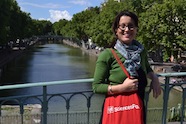 The end of the academic year brings about the opportunity to provide insights and judgements – admittedly entirely subjective – as to the Master of International Development progamme in which I am currently enrolled at Sciences Po Paris School of International Affairs.
The end of the academic year brings about the opportunity to provide insights and judgements – admittedly entirely subjective – as to the Master of International Development progamme in which I am currently enrolled at Sciences Po Paris School of International Affairs.
I have two separate undergraduate qualifications in French language and Nutrition from the University of Otago – two areas at opposing ends of the academic spectrum. However, a previous internship with the World Health Organization in Geneva during my undergraduate studies provided me with significant insight into global health policy-making and governance such that I now aspire to pursue a career in this area. The Masters programme at Sciences Po is the missing link. It is a sum of my wide range of academic studies and professional experiences so far – from my studies at Paris III Sorbonne Nouvelle in 2012 and my dissertation on contemporary French politics as partial fulfilment of the requirements of a BA(Hons) in French, to the various internships I have undertaken in Geneva with the World Health Organization, in Wellington with the European Union Delegation to New Zealand and in Addis Ababa with the International Food Policy Research Institute in the Ethiopian country office.
The Masters programmes at Sciences Po are designed to be interdisciplinary and professionally oriented. The foundations of my course are in international economics and politics, with thematic concentrations in international development, global health and environment. Given the diverse (geographically- and academically-speaking) profiles of students enrolled in the programme, courses are taught from an introductory level, but accelerate quickly through to post-graduate level. In addition, the academic content is complimented by assessments that are intended to replicate the skill sets required by international relations professionals. For example, in a class this semester on international cooperation in health and health systems in low-income countries, we were required to submit briefing papers, position papers and diplomatic negotiating strategies for the ministerial delegation of a low-income country attending the World Health Assembly that was held in Geneva at the end of May. Not only was such an exercise invaluable for its ability to draw on my wider international development, economics and geopolitical knowledge in the context of global health (and specifically the ongoing Ebola epidemic, given that I chose the ministerial delegation from Sierra Leone), but also for the opportunity to work closely with a visiting Professor of global health law and diplomacy from the Institute of Tropical Medicine in Antwerp.
Such a practical focus is something that I have found to be a distinguishing feature of Sciences Po. The faculty are a mix of academics and professional practioners and all courses are taught with the end goal of developing future international policy makers, diplomats and politicians. The alumni network of the school is particularly strong and, as such, the opportunities available for the compulsory internship in lieu of classes for the upcoming third semester are particularly impressive. In this context, I have been offered a six-month internship with the Institut Pasteur – France's leading biomedical and infectious disease research institute. I will be working with the Director of the Centre for Global Health which I believe will be an incredible opportunity to build on my background in nutrition and non-communicable diseases and gain experience in the area of communicable/infectious diseases. Equally, the reputation of the school is such that the list of visiting speakers ranges from current and former UN Secretary Generals to prominent politicians, academics, international civil servants and business executives. Both Kofi Annan and Ban Ki Moon held separate conferences at Sciences Po within the space of a few weeks, while the former President of the European Council, Herman Van Rompouy's final public address before the end of his term as Council President was delivered at Sciences Po and was followed by an address later in the week by the heir to the Hermès empire on the future of luxury goods consumption. The end result is an academic setting in which motivation drips from the classroom ceilings and the commitment to excellence is showcased on a daily basis.
Overall, I can certainly see how this Masters programme may be able to further my entry into a career in global health policymaking and governance. Although the workload has been somewhat strenuous, I have thoroughly enjoyed the experiences of my first year at Sciences Po and after a short holiday, I am looking forward to starting my internship at the end of June.
